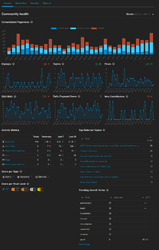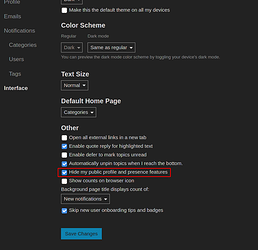Certainly, Simon, as a simple user I can avoid sharing much about my real life identity here (which might not be especially interesting for any of you, anyway). On the other hand, it’s not that much about a single individual like me now, I think, who can try to understand and avoid some of the internet-wide tracking mechanisms, that seem to be in use so far.
What I am worried about, rather, is the impact of the vast majority of people not being capable or willing to make such an extra effort. That’s why I think our society as a whole could largely benefit from more privacy by design software. If an application like DeltaChat becomes more well known – and widely used –, this might be very helpful for all of us.
That’s why I‘d strongly tend to agree to you. Certainly it’s desirable to concentrate as much as possible of your precious working time on DeltaChat itself:
So I wouldn’t suggest writing any forum patches, of course. Even if you had enough resources for doing anything like that, the most ingenious patches might have a hard time correcting a software design, that seems to go into quite a different direction.
What you probably could try, of course, (maybe when you need some break from your routine work anyway,) is having a closer look at the administration preferences interface of the forum software: Maybe there are still some ‘hidden’ tweaks to trigger some more privacy, especially to switch off some of the automated user tracking. As link2xt suggested:
If you find any possibilities, very good. If you don’t, that might also be a result worth keeping in mind. Maybe at some later point of time, there will have to be made some choice again. Considering the current state of the project, the forum does obviously not seem to require – or allow – much urgent administration or design attention (apart from, maybe, the keyless API, which would lead to a slightly different topic, though).
Now, imagine a changing situation. Maybe, as people start finding more need for private online conversation, DeltaChat becomes more widely known and adopted. Then there might also be more critical views and voices.
As of now, some people might simply turn away silently (as I had to consider, when I surprisingly found out the DeltaChat forum collects much more usage information than typically necessary). But at a point of time, when the DeltaChat approach has managed to receive more of the attention it deserves, any insecurity or discontent arising from its apparent work style (or seemingly limited privacy scope) might even start spreading as a kind of (bad) news about it.
When a project or company apparently offers a privacy relevant application, expectations might of course be somewhat higher than on other projects coming without this important message. People might want to have a look at, how well do things fit together. Is it all convincing? Consequently, some might try to find out, how well privacy principles are generally being recognized and observed in relation to your project.
Of course, when people have to decide for themselves, whether to trust or reject any offer, they necessarily refer to their personal insights and standards. These can obviously be can be quite different. For a project or company, such a broad range of attitudes or expectations is not always easy to handle. Nice to see someone still finding time and patience to ask, as you kindly do:
Trying to answer directly, I could say: For me, its mainly a question of social development and perspective. If we go on permitting large corporations and authorities to gather and process digital representations of much of our private lives, finally we might have a hard time trying to keep up anything that deserves to be called democracy.
That’s, for example, why I like the DeltaChat approach. Properly applied, it could help relieve us from some of the worldwide mass surveillance that has been developed and implemented during the last two decades.
One of the preconditions for this to work, might be that its users-to-be can see the DeltaChat team showing and consequently applying a good overall understanding of privacy challenges. Of course, no one can in any way demand such a far-heading or even idealistic approach. No one else than the team and its members themselves can decide how deep they want to plunge into a seemingly bottomless pond like this.
In case a team wants to head further into this kind of direction, it might eventually even lead well beyond the (conscious) privacy concerns of many simple users, I think. As ordinary users, we typically cannot have the same broad basis of knowledge and understanding as the members of a specialized team. Most of us might simply not be sufficiently aware of the privacy or security implications of what we are trying to accomplish on the web.
This is why recognizing principles like privacy by design and, with it, for example privacy by default can be so essential, I think. Of course, in an online world dominated by data mining corporations this can require some intense preparation, orientating more and more towards alternative approaches.
On the other hand, it might also offer a clear, far-reaching perspective, that can deepen the exchange with similarly minded people and increase the personal sense of work. And, from my point of view, it might also help to make a privacy related software application like DeltaChat even more attractive and convincing.

 So probably it came just as part (or feature) of the forum software.
So probably it came just as part (or feature) of the forum software. Somehow, different kinds of obstacles might seem more likely to be on the way. Anyhow, in the software business, you can probably never really know, what might happen next month or next year.
Somehow, different kinds of obstacles might seem more likely to be on the way. Anyhow, in the software business, you can probably never really know, what might happen next month or next year.